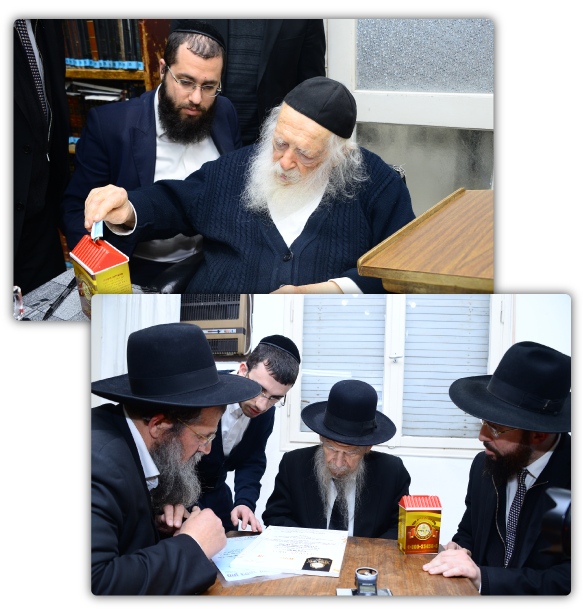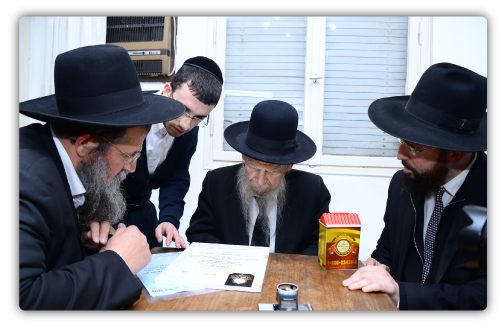Who Are We?
Kupas Matan B’seser Kiryat Sefer (a registered amutah) was founded on 11 Adar II 5755 (Mar. 13, 1995) in Kiryat Sefer, Modi’in Ilit, and actively began its work in the neighborhood of Kiryat Sefer in the course of 1997. Later, as newer areas — Neot Hapisgah, Green Park, and Heftzibah — were populated, they, too were included in the circle of activity.
The residents of Modi’in Ilit number a high percentage of large families, including a substantial count of needy families. Most of those assisted by the organization are unable to provide for their family members due to a serious crisis. The Kupas Matan B’seser Kiryat Sefer has set as its goal that “no child should remain hungry.” In Kiryat Sefer, this simple sentence is at times a matter of life and death.
The directors and gabba’im of the Kupah work virtually around the clock. The need for this entity intensifies from day to day, as the general financial situation becomes more serious. The financial crunch does not impact positively on these impoverished families, to say the least.



Help Now!
Food Vouchers
One donation feeds an entire family!
Bread & Milk
Family
fundamentals
Free Glasses
See the chessed to believe it!
Temporary Distress
Sometimes, a little help
goes a long way…
Hachnassas Kallah
Marrying kids off respectably and responsibly
Mazor La’Choleh
Financial support for patients suffering from physical and emotional illness
families are waiting for your help and support! Contact us now to see how you can help!
Our Policies
One of the supreme goals of the organization is to restore these families’ independence. We are not speaking merely of one-time grants or steady allotments, but, rather, a system geared at rehabilitating the families and giving them the tools and the confidence to get past their financial crises.
And no, we’re not talking about luxuries. The organization deals primarily with assuring the family the most basic commodities. Once in a while, the Kupah must put in a large sum to pull back a family from the verge of financial collapse. But most of the time, their job is to support these families at the foundation and help them achieve financial stability.
Many of the families who were assisted by the Kupah in the past are no longer charity cases, thanks to the work of Siyata, which rehabilitates them and teaches them how to manage their money wisely with counseling by a staff of the leading professionals in the field. They review the family’s balance of expenses vs. income, their shopping habits and household management methods, etc. Only when it becomes clear that, in spite of the financial measures that were taken, the family still cannot yet function independently, they are given a monthly allotment from the tzedakah fund. Usually, we are speaking of large families, who, due to various hardships or serious illness of a family member, cannot sustain themselves. These are not families that buy luxury items and live an extravagant life, but people who make do with the minimum, and the little they have is earmarked for basic household needs.
At the offices of the Kupah, situated at 24 Avnei Nezer St. in Modi’in Ilit, there are additional departments, operated primarily by volunteers, with the goal of ensuring that everyone in need will receive assistance.

Matan B’seser – Facts & Figures
The Tzedakah Process
Modi’in Illit is one of Israel’s poorest cities, and applications for financial assistance stream into the Kupah’s administrative offices on a daily basis. Matan B’seser maintains a strict system to ensure that tzedakah is distributed equitably, according to need. Every application undergoes a close evaluation in order to determine the level of need.
a. One-time grant:
When a one-time grant is requested, and a review of the case indicates that assistance is justified, the grant is given immediately. In general, these are cases of an isolated financial crisis or unusual expense, such as hospitalization costs, birth, a sick child, dental expense, and such. These one-time grants do not require the intervention of many people, and are generally approved by the rabbanim of the city, once the facts have been verified by people familiar with the case (generally, the rav of the local shul or a relative involved in the situation).
b. Request for steady support:
A request for steady support is generally referred to the monthly allotment department, usually to the “Milk Fund.” This translates into a monthly deposit into the family’s grocery account for the purchase of basic foodstuffs, via the food stores operating in the recipient’s neighborhood. The idea at the basis of this Fund is to give these needy people the full dignity they deserve, which might be diminished by placing cartons of food outside their door… By depositing money into the recipient’s grocery account, he can buy the basic products at the store where he is used to doing his shopping; the only difference is that payment is made by a monthly deposit from the Fund. In most cases, even the recipient’s wife and children are unaware that they are being supported by Kupas Matan B’seser!
c. Fundraising as necessary:
When it becomes clear that help with monthly expenses is not sufficient, the gabba’im consult with the rabbanim of the Kupah so as to weigh additional options of rehabilitating the family. If the conclusion is that the family requires a substantial sum of money in order to put them on their feet (orphans, single-parent families, build-up of debts, financial collapse, and more), a special collection is made for the family, with details of the situation being presented to the donating public.
d. Opening a Fund:
If the collection that was made did not complete the job of rehabilitating the family — and there are innumerable cases such as these — the organization establishes a Fund for the needy family, which will grant them financial peace and tranquility until the problem the family is coping with is resolved.
e. Referral for Financial Counseling
Sometimes, all the efforts to put the family on their feet and help them with running expenses are unsuccessful — as evidenced when they appeal for assistance after a collection was made or a fund established. When it is clear that no financial aid will halt the “financial leakage,” the family is referred to the Siyata department, whose job is to provide financial counseling and help the family track the balance of their expenses vs. income. The family continues to receive ongoing mentoring, including the use of tracking sheets and regular discussions with professional counselors, until they have learnt how to take the financial steps that will lead them to a secure financial future.
It is important to note: In these cases, close cooperation with Siyata is an absolute prerequisite to continued receipt of the Kupah’s grants and assistance.
